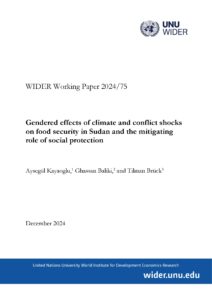Climate change and violent conflict are defining challenges of our time. However, it is not yet understood how they interact in shaping human welfare and food security, how their interaction shapes gendered outcomes, or how social protection systems can mitigate their impact.
To address these knowledge gaps, we first examine how household food insecurity relates to conflict and climate shocks and whether these associations are gender-sensitive. Second, we test what mechanisms can reduce the negative impacts of these shocks.
Our empirical analysis relies on novel survey data of 7,908 rural households collected across 14 states in Sudan in 2022. Sudan currently faces floods, droughts, and violent conflict affecting agricultural production and food supply. We find that climate shocks do not significantly affect food consumption scores (FCS), while exposure to violent conflict leads to a substantial decrease in FCS.
Both productive and non-productive assets increase FCS for all households, especially female-headed households. Longer distances to agricultural input and output markets correlate with lower FCS, particularly for male-headed households. Women’s social group membership positively impacts on FCS for female-headed households.
However, women do not receive additional benefits from other social networks during climate and conflict exposure, while male-headed households benefit from all types of social networks. Income diversification is identified as a key strategy for improving FCS, particularly for female-headed households during conflict.
Informal cash transfers significantly improve FCS, especially for female-headed households. In contrast, formal cash transfers negatively correlate with FCS, although they positively impact on male-headed households during violent conflict. Overall, we recommend targeted social protection programmes that address gender disparities and enhance resilience among vulnerable populations.
Publication Details
- Year of Publication: 2024
- Region/s: Sub-Saharan Africa
- Theme/s: Human Development · Individual Decision-making · Micro-Data Collection · Shocks & Livelihoods
- Research Topic/s: Climate Change · Gender · Violence & Conflict
- DOI: https://doi.org/10.35188/UNU-WIDER/2024/538-7






